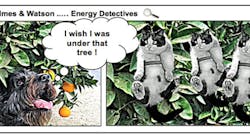Watson: Using the analogy of picking fruit, I can’t see how lighting projects could possibly be considered “Low Hanging Fruit”. They are expensive, require a significant investment and have long paybacks. Walking through a field picking low hanging fruit only requires a sack over one or two of your four shoulders.
Watson: What exactly is “Low Hanging Fruit” Holmes? Why are we always hearing about it? Why don’t we hear about “Low Hanging Bacon” or “Low Hanging Cats”?
Holmes: I would guess it is just another term brought to us by the same people who brought us “Win-Win”, “Granular”, “Traction”, “Enterprise” and “Triple Bottom Line”.
Watson: In other words, another way of saying “I have no idea and since I am incapable of original thought, I just repeat meaningless phrases.”
Holmes: That’s one way to look at it. Actually, the term originally came from picking fruit such as apples, oranges and lemons that are abundant and easier to pick on the lower branches.
Watson: How does the term apply to Energy Efficiency?
Holmes: From what I’ve read most people in our profession think “Low Hanging Fruit” means new lights. An engineer at an electric company told me that the low-hanging fruit for them was replacing metal halide lights with high-efficiency fluorescents. He said new lights is a “no brainer”.
Watson: Using the analogy of picking fruit, I can’t see how lighting projects could possibly be considered “Low Hanging Fruit”. They are expensive, require a significant investment and have long paybacks. Walking through a field picking low hanging fruit only requires a sack over one or two of your four shoulders.
Read our Blog on Lighting Titled "Lighting Projects Confirm Lack of Qualified Energy Professionals"
Holmes: Although I have never used the term “Low Hanging Fruit” (please bite me if I ever do) Watson, in conjunction with energy efficiency projects, I can tell those wanting to know where to start, where to find the lowest cost opportunities to generate the fastest savings in industrial plants, and listen closely, “it’s not lighting projects”. Lighting projects may be good for utility companies and the people selling the light bulbs but they are not what’s best for the owner, a key point that seems to have been all but forgotten in many energy projects.
The best opportunities with the fastest paybacks always come from no-cost, low-cost changes that match the operation of the existing energy systems to the energy requirements of the facility.
Installing a permanent Energy Monitoring System and using the resulting data to tune up existing energy systems in existing buildings can reduce the energy consumption and cost by 10%, 20% and more without the need for capital projects. In our experience the payback is always weeks or months.
Watson: So you are saying that if you were, heaven forbid, to define it, Low Hanging Fruit would be the lowest cost opportunities generating the fastest savings with the shortest paybacks.
Holmes: Isn’t that the original definition? Somehow our industry has redefined it to suit their needs, without regard for the first cost. While there may be a plethora of people to sell, manufacture and install light bulbs, there are few Energy Professionals with the training and experience to actually understand complex energy systems and how to operate them efficiently.
Watson: Thinking of Energy Efficiency in terms of one-time projects that replace older less efficient equipment with new is really misleading and limiting isn’t it? People are looking for simple solutions to complex problems. As we well know from all of our projects, Energy Efficiency is an ongoing process requiring skilled practitioners.
As you have been saying and writing for many years Holmes, technology is only a tool, people are the key.
Holmes: Right and I’m not the only one. In his article “Avoiding The Energy Management Software Trap: Leverage Your Human Capital” , Jim Meacham, a founding Principal at Altura Associates says:
“We are in a nearly constant search for the quick fix…We constantly overvalue technology and undervalue people. This is perhaps one of the most destructive forces at play. We need to shift our thinking around our investments in software platforms and face the reality that even the most sophisticated technology cannot substitute for effective human capital… Fancy equipment and software can be useful tools, but the efforts of a skilled person will always be the most critical element. In any scenario, mastery of a complex craft requires training, knowledge, experience, and critical thinking.”
Watson: Sounds like he knows what we know, that the real opportunity to create and maintain savings comes from providing the operators of the energy systems with the actual information and training they need to operate building systems efficiently as possible under all conditions on a continuing basis.
Holmes: Watson, you’re a genius!
Watson: Couldn’t we try just one Low Hanging Cat?
Tell us about your experiences, both good and bad with energy professionals, what has worked and what hasn't. Send us your comments, thoughts and suggestions on how to improve our profession so we can all continue to learn from each other. Thanks – Holmes & Watson.
